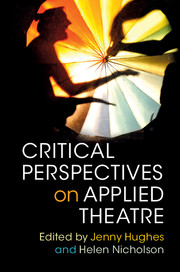Book contents
- Frontmatter
- Contents
- List of figures
- List of contributors
- 1 Applied theatre: ecology of practices
- PART I HISTORIES AND CULTURAL MEMORIES
- 2 Toward a historiography of the absent: on the late pasts of applied theatre and community performance
- 3 A pre-history of applied theatre: work, house, perform
- 4 Applied theatre and cultural memory in East and Southeast Asia
- 5 Dear Nise: method, madness and artistic occupation at a psychiatric hospital in Rio de Janeiro
- PART II PLACE, COMMUNITY AND ENVIRONMENT
- PART III POETICS AND PARTICIPATION
- Notes
- Index
- References
3 - A pre-history of applied theatre: work, house, perform
from PART I - HISTORIES AND CULTURAL MEMORIES
Published online by Cambridge University Press: 05 April 2016
- Frontmatter
- Contents
- List of figures
- List of contributors
- 1 Applied theatre: ecology of practices
- PART I HISTORIES AND CULTURAL MEMORIES
- 2 Toward a historiography of the absent: on the late pasts of applied theatre and community performance
- 3 A pre-history of applied theatre: work, house, perform
- 4 Applied theatre and cultural memory in East and Southeast Asia
- 5 Dear Nise: method, madness and artistic occupation at a psychiatric hospital in Rio de Janeiro
- PART II PLACE, COMMUNITY AND ENVIRONMENT
- PART III POETICS AND PARTICIPATION
- Notes
- Index
- References
Summary
This chapter explores an ambiguous precedent in the histories of applied theatre: theatrical entertainments in the Victorian workhouse in Britain. Historical conceptions of Victorian workhouses have characterised them as ‘Poor Law Bastilles’, imprisoning vulnerable populations in shaming and repressive regimes of discipline and punishment (Engels 1993 [1845]: 292). In the workhouse, the poor were categorised according to the extent to which they were deemed able to work, with a time and place regime crafted to condition the able-bodied poor into habits of work and good character by, for example, following a strict daily routine and performing monotonous forms of labour. However, the Victorian workhouse was also part of the first centrally and systematically administered welfare system, and it focused on improving the care and education of neglected and orphaned children, and providing comfort for elderly, ill and vulnerable adult members of society. On the one hand, the workhouse entertainments examined in this chapter were compliant with a disciplinary regime that recognised life as valuable only when it works, that is, when immersed in capitalist systems of productive labour. On close inspection, however, the permitted forms of sociality exemplified by visiting entertainers also show how the workhouse regime opened up to the economically excluded in ways that prefigure egalitarian and progressive forms of cultural practice.
Here, I examine three theatrical performances – a glee concert, temperance entertainment and Sunday School amusement – taking place in a workhouse in Rochdale (Lancashire, UK) between 1877 and 1887. As theatrical forms of rational recreation and missionary education, each is embedded in the Protestant religious culture predominant in Britain at the time which, as Max Weber famously asserted in his classic work The Protestant Ethic and the Spirit of Capitalism, accelerated the historical development of capitalism across Europe and its colonies (2002 [1905]). Although an exploration of the colonial trajectories of the theatrical encounters with the poor explored here cannot be the focus of this chapter, it is important to note that, as cultural practices embedded in discourses of workfulness, respectability and self-help associated with the development of capitalism, their significance extends far beyond the specific spatial and temporal context examined. It is also important to draw attention to the way each example exhibits what might seem surprisingly imaginative and social modes of religiosity concomitant with Protestant religious culture.
- Type
- Chapter
- Information
- Critical Perspectives on Applied Theatre , pp. 40 - 60Publisher: Cambridge University PressPrint publication year: 2016
References
- 2
- Cited by



